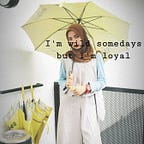If It’s Enough with Less, Why We Need More?
“Do not enrich yourself with objects. Instead, enrich your body with sensations, your heart with feelings, and your mind with principles”
A book summary from Loreau #1st Chapter
We waste and destroy so much (too many material possessions, too many temptations and desires) and pollute our environment. Only once we have eliminated waste, only then can we take a new meaning , a different and deeper dimension on our everyday essential activities (the less quantity the more quality). Opulent luxury imprisons and destroys our soul, while simplicity offers the solution to so many problems. Simplicity means possessing little, clearing the way for the bare necessities, the quintessences of things.
Hi peeps! here I serve six points you need to concern regarding with ‘The Burden of Possessions’ summarized from the book L’art de la Simplicate by Dominique Loreau
- The need to hoard
Why are we so attached to things?
For many people, material is an expression of selfhood, proof of their existence. They associate their identity and self-image with the thing they possess. The more they have, the more secure, accomplished and fulfilled they feel. Many things we own are superfluous. We used them because they were there, not because they were essential.
2. Hoarding and indecision
Throwing things away requires effort. Getting rid of things is not difficult in itself, but judging what is useful and what is not can be. Letting certain objects go can be extremely difficult, but your satisfaction will be all the greater.
3. Fear of change
Some people see the process of material divestment as wasteful in itself. It makes them feel guilty. But this process is only wasteful if we throw away things we can still put to good use. If we rid ourselves of things that serve no purpose, we are not wasting anything, it is far more wasteful to hold on to something that’s of no use to us.
4. Choose the minimum
Living with little improves the quality of existence. To embrace minimalism we may need a degree of spiritual and intellectual baggage, rather than material possession. Discipline, clarity and determination are the preconditions for a life lived with the strict minimum. Minimalism requires an ordered lifestyle and careful attention to detail. Eliminate as much as possible, concentrate on what really matters. You will find yourself contemplating life with greater lucidity.
Is having more important than being?
5. Use as little as possible
Know how to gauge the true value of every object encountered in life:
- what is its practical use?
- what aspect of life does it belong to
- how does it enhance your existence
Discern:
- its constituent parts
- their probable lifespan
- the feelings and sensations they inspire in you
Do not enrich yourself with objects. Instead, enrich your body with sensations, your heart with feelings, and your mind with principles. The only way to avoid being possessed by material things is to own nothing and, above all, to desire as little as possible. We cannot be open and receptive if we have not made space first. An excess of things is invasive, overwhelming, and deflects our attention from the essentials enabling our minds cluttered.
6. The possessor is possessed
We are the one who possesses things, not possessed by things!
Each of us is free to have whatever we like, but what matters is our attitude to things, our knowledge of our own limits, needs and expectations. Refusing to own too much brings a greater appreciation of the things that give us spiritual, emotional, and intellectual pleasure. To own more than the strict minimum is to burden yourself with extra worries.
If you try to fix your mindset and behaviour about the meaning of possessing things and materials, to be aware of the six points above is the right step to start ;)
